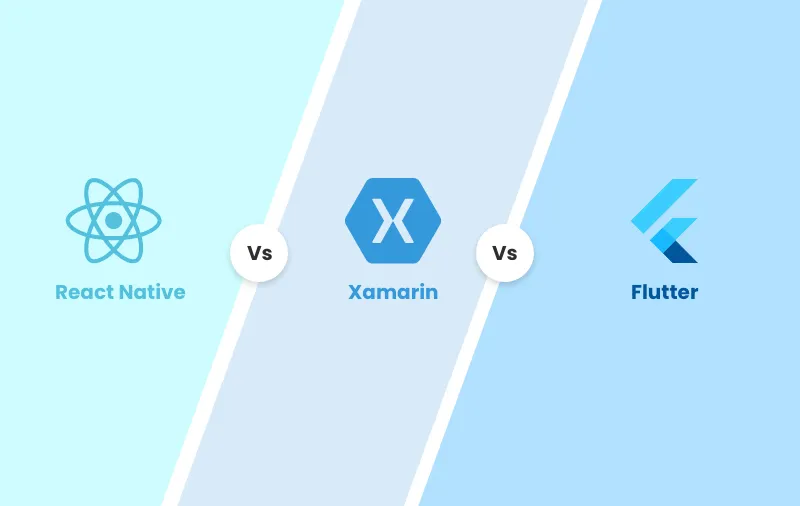

Flutter vs Xamarin vs React Native - Which have to Choose
Flutter vs Xamarin vs React Native - Which cross platform Mobile App Development framework to choose in 2020?

The significance of cross platform development is there for every one of us to see. In today’s business world, where a mobile app or a web app is a must to take your business to the next level, cross platform app development has become very popular, especially while building mobile apps.
When we talk about cross platform, two common names heard across the technology sector, that we want our applications to work on, are either iOS or Android or both. The question however is that with many available frameworks to choose from, which would be the most suitable one?
Which is the most suitable one?
The main objective behind organizations choosing cross platform development is that, it works out as a cost efficient venture for them, as well as saves time. The most popular cross-platform frameworks which are used on a consistent basis are React Native, Xamarin and Flutter. A cross-platform framework reduces the cost of application development by half. The time taken for developing the application i.e. the life cycle of the development of the application also reduces to a greater extent, as the same code can be reused for developing applications across platforms. Almost 97 % of the code is shareable for all the platforms. Now, to understand which one would suit your business the best, we’ll go through each one of them and by the end of this article, you would have arrived on your choice of the framework.
An Insight into Flutter
One of the most popular open-source frameworks developed by Google, Flutter is most sought after for building quality user interfaces. Why developers choose to look at Flutter is because it offers ready-made gadgets, command-line tools and APIs required to build an application. Front-end developers appreciate Flutter a lot as it allows reusing codes. Having said this, frameworks do have certain advantages and disadvantages. Flutter is no different. Let’s take a closer look.
Advantages
- With Flutter, codes can be implemented at a rapid pace.
- Supports faster error fixing.
- The extension of Flutter called as Flutter SDK is effective on desktop, web and embedded devices as well.
- Being one of the most sought after open source framework, Flutter is easy to code.
Disadvantages
- The size of a Flutter App being large, developers have to re-think on the size of images to be used in their applications.
- Though Flutter continues to gain more visibility due to the plus points it brings, it is still not yet that strong and feature rich when compared to native apps.
- Flutter is not supported by continuous integration.
- Flutter is yet to mature to its fullest capacity since its libraries are not yet completely established and hence developers have to give that extra bit of focus while building applications.
An Insight into Xamarin
As one of the oldest cross platform, mobile app development framework, Xamarin assumes more credibility as it associates with C#. Xamarin is simple to begin with and facilitates reusing of codes up to 95%. Xamarin is suitable to build most types of mobile apps as the technology is divided into three different and critical parts in, Xamarin Platform, Xamarin Insights and Xamarin Cloud. This framework is free for teams below the size of a maximum of say 5 members. Above that, it is necessary to obtain a licence. Like Flutter, Xamarin too comes with some highs and bit of lows as we can see below,
Advantages
- Xamarin is known to support hardware features like Camera and GPS.
- Xamarin supports the use of plug-in software to enhance its performance.
- Xamarin is compatible with the MVC and MVVP architecture
- Xamarin framework works to the satisfaction of the developers as it performs almost like a native app.
Disadvantages
- Complex applications might need some more time if being developed in Xamarin
- The size of Xamarin app being large, it usually is a bit slow during deployment and takes time.
- This framework is not completely free for all users.
- Xamarin has minimal community support.
An insight into React Native
React Native is an open source framework that comes in with two major plus points. It makes use of the JavaScript Language as well as Native API’s which delivers a very effective end user experience.An open source framework, React Native was developed by Facebook and can be applied on both iOS and Android platforms. The performance of React Native can be improved suiting upgrades technology, newer versions and user needs. React Native comes in with certain advantages and disadvantages.
Advantages
- React Native helps in building robust user interfaces, especially for mobile applications.
- Supports faster application development.
- Being open source framework, it is available for free and helps in cost effective application development.
- Compared to Xamarin, React Native enjoys a good community support.
Disadvantages
- React Native based applications are slightly slower compared to the other two frameworks.
- Allows the use of plug-in software but does not guarantee the security of the software.
- Not Suitable for building and deploying highly complicated applications.
- The apps built using React Native might have to be upgraded on a frequent basis.
Comparison in a Nutshell
Understanding each of these three frameworks in a greater depth would have given you a better idea in choosing the best out of these. However, there are certain specific parameters, based on which, these three well known frameworks can be analysed, to give us an even better idea.
- When it comes to global popularity and acceptability, recent studies indicate that Xamarin scores above React Native and Flutter.
- However, when it comes to global performance, React Native enjoys a better position. The main difference here being the effective use of the Dart code by React Native. As a result applications developed by React Native are a bit stronger as compared to either a Flutter or a Xamarin. React Native and Flutter can be used to develop all type of Apps as compared to Xamarin.
- The diameter of the flutter framework is much bigger as compared to either a Xamarin or React Native.While the core engine of Flutter uses about 2.7 MB of the space plus the code space, the codes in React Native, are differentiated to multiple blocks that make the proceeding easy. Xamarin uses MVC and MVVM architecture that helps it to accelerate the process of an application with fewer diameters.
Conclusion
By now, I guess you might have got an idea as to which framework, would best suit your application development needs.All of the three frameworks mentioned above come with their fixed set of advantages and disadvantages. They have contributed to some of the finest apps, used across various business sectors, across the globe. While Flutter and React Native are good from the cost-efficiency perspective, Xamarin excels in terms of delivering a smooth user experience.
In a nutshell, Flutter offers you the fastest development, therefore if you want an app in a short period of time, go for it. Comparatively, React Native is popular, simple and with good community support. If you’re looking at these qualities in your application, you should select React Native over Xamarin or Flutter. Finally, Xamarin allows 96% reuse of the code, which is higher than any other cross-platform development.As a result, the choice of the best framework completely depends on your specific project needs as all the three offer unique advantages over each other. At the end of the day, it is a developers delight to work on any of these frameworks to build a smart mobile application.






